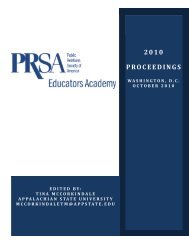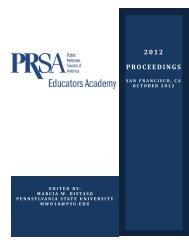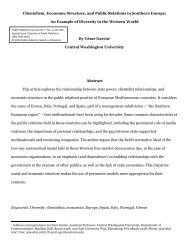2008 PROCEEDINGS - Public Relations Society of America
2008 PROCEEDINGS - Public Relations Society of America
2008 PROCEEDINGS - Public Relations Society of America
Create successful ePaper yourself
Turn your PDF publications into a flip-book with our unique Google optimized e-Paper software.
IMC and its Integration into Programs <strong>of</strong> Journalism and Mass Communication<br />
Andrew Lingwall<br />
Clarion University <strong>of</strong> Pennsylvania<br />
alingwall@clarion.edu<br />
Abstract<br />
This study explores the level and nature <strong>of</strong> curricular integration in university programs<br />
<strong>of</strong> journalism and mass communication according to the principles <strong>of</strong> Integrated Marketing<br />
Communication (IMC). It also explores respondents’ perceptions about the value <strong>of</strong> such an<br />
integrated curriculum.<br />
The key findings <strong>of</strong> the study are: (1) that regardless <strong>of</strong> institutional factors, institutions<br />
surveyed have achieved only moderate levels <strong>of</strong> integration across degree programs, courses, and<br />
course topics; (2) that regardless <strong>of</strong> institutional factors, institutions surveyed have achieved<br />
significantly higher levels <strong>of</strong> integration within courses integrating advertising and public<br />
relations; and (3) significant differences between respondents’ perceived value <strong>of</strong> an integrated<br />
curriculum according to their number <strong>of</strong> years <strong>of</strong> pr<strong>of</strong>essional experience.<br />
The findings in this study create implications for educators and administrators in four<br />
major areas <strong>of</strong> work: program and curriculum planning, faculty hiring, ties to industry, and<br />
institutional/political issues.<br />
Introduction<br />
While the concept <strong>of</strong> Integrated Marketing Communication (IMC) has gained significant<br />
ground among practitioners in public relations, advertising and marketing over the past 15 years,<br />
its success in assimilating into academic programs at universities has been less clear.<br />
Some departments, schools, and colleges <strong>of</strong> journalism, mass communication and<br />
business have integrated their curricula or built new programs based on IMC concepts. However,<br />
others have retained traditional walls between the disciplines or simply added IMC units into<br />
existing courses. Educators’ academic backgrounds, ranging from academic discipline and<br />
educational level to years <strong>of</strong> academic or pr<strong>of</strong>essional experience, may influence their<br />
perceptions <strong>of</strong> the value <strong>of</strong> curricular integration.<br />
Over the last decade, only a limited number <strong>of</strong> studies have focused on the topic <strong>of</strong><br />
curricular integration in journalism and mass communication programs, and on educators’<br />
perceptions <strong>of</strong> its value. It is critical to know more about the current level and nature <strong>of</strong><br />
curricular integration in programs <strong>of</strong> journalism and mass communication, and how educators’<br />
pr<strong>of</strong>essional backgrounds might be influencing degree programs and course <strong>of</strong>ferings.<br />
In 2005, IMC researcher and educator Charles Patti threw down a pedagogical challenge<br />
to all JMC educators. He underscored the need to find ways to integrate the social and behavioral<br />
sciences with marketing and business in the classroom. He also called on educators to<br />
acknowledge that IMC is an emerging discipline worldwide, and to make the effort to bring<br />
current thinking about IMC to students everywhere.<br />
Some educators have echoed Patti’s call. The 2006 Report <strong>of</strong> the Commission on <strong>Public</strong><br />
<strong>Relations</strong> Education calls upon educators to provide their students with an education that is broad<br />
and interdisciplinary in nature. Notably, the commission’s list <strong>of</strong> necessary knowledge and skills<br />
includes marketing and finance, uses <strong>of</strong> research and forecasting, management concepts and<br />
theories, strategic planning, and technological and visual literacy. “More than ever, this<br />
knowledge base must be interdisciplinary,” the report noted. “Principles <strong>of</strong> public relations and<br />
59
















